Books by ACPC Members
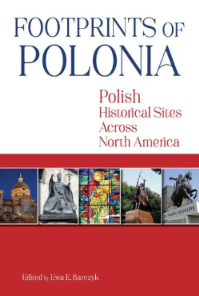
Footprints of Polonia
by Ewa Barczyk
The innumerable contributions of Polish immigrants and their descendants on communities in North America can be seen on monuments, bridges, churches, cultural centers, and cemeteries across the continent. These “footprints” of Polonia (the Polish diaspora), commemorating towering events and figures from history that are a source of pride among Polish Americans, are cataloged for readers in this unique volume. From Revolutionary War heroes Tadeusz Kosciuśzko and Casimir Pulaski to more recent figures like Pope John Paul II and political movements like Solidarity, statues and historic sites all over North America pay homage to their contributions and importance.
A version of this guide was originally published in 1992, and in the intervening decades, many shifts have occurred in Polish American communities. The Polish American Historical Association (PAHA) initiated work on this new volume with the goal of highlighting new sites of Polish-interest and the important ways in which Polish immigrants contributed to history, politics, arts
and society. This book explores key Polish-interest sites in forty-six U.S. states, eight Canadian provinces and parts of Mexico and the Caribbean as well.
This project is based on the input of volunteers from Polish organizations all over North America, who helped identify the most important sites in their region and provided summaries and pictures for over 200 entries. The guide is organized alphabetically by states and provinces, with entries that describe the historical significance of each site. Most entries also include a color photo. Informative prefaces and introductions from the editor and other historians help contextualize the culture of Polish immigrants and their deep, lasting connection to Poland.
Footprints of Polonia can serve as the perfect travel companion for anyone who wants to learn about the rich history and heritage of the Polish diaspora. It is also an excellent resource for Polish language schools and Polish American organizations who want to learn more about and take pride in sites of interest in their area.
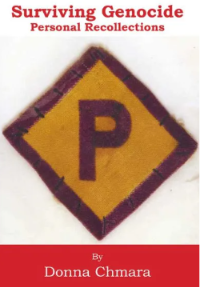
Surviving Genocide: Personal Recollection
by Donna Chmara
The author describes the loss of her home in Eastern Europe during World War II, her family’s deportation to a Nazi labor camp, and their eventual arrival in the United States. Relying on historic sources, interviews with twenty survivors and personal experience, the author focuses on the danger of identifying solely with a group or ideology rather than with the fact of our shared humanity.
Exiled from her home in Eastern Poland as a baby, the author chronicles the aggression against Polish citizens by Nazi Germany and the Soviet Union during World War II. For many it will be the first time hearing about the deportation of thousands to the Soviet Union for forced labor, a topic they have not met in school or in the media. Nor do they know about plans to replace Christianity and all religion with deification of Hitler and the Nazi party. The author weaves this type of information into true accounts of survival from 20 eyewitnesses whom she interviewed over the course of 10 years.
Surviving Genocide: Personal Recollections expands our knowledge of World War II, that of the attempted genocide against Slavic Christians of Eastern Europe.
Most books about surviving the war describe the struggles of one person or family.
This book is different in that the people the author interviewed faced diverse and generally unknown hostile environments. For example, a family is exiled to Russia near the Arctic Circle, women toil on the Kazakhstan steppe to produce food for the Soviet army, people in the author’s village of birth in what is now Belarus face winter in holes in the ground, single girls are forced to work in German factories and as domestics, and a Catholic priest is used for medical experiments in Dachau.
These survivors are primary sources who begin to demonstrate the full sweep of events as they shine a light on the dangers of identifying with a group or philosophy at the expense of our shared humanity.
Surviving Genocide: Personal Recollections contains a foreword by British historian Norman Davies, an interview with Nobel laureate Czeslaw Milosz, an annotated bibliography, photographs, and maps. Survivors’ statements have been fact-checked and are validated by citing historic sources. The author will market the book through public speaking and use of social media platforms.
The number of World War II survivors is dwindling. Their witness will ensure a broader knowledge about a particular time and place in history.
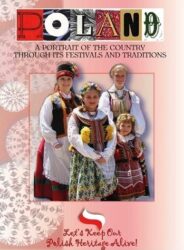
Poland: A Portrait Of The Country Through Its Festivals And Traditions
by Cecelia Glembocki, Carla Tomaszewski
Author Carla Hazard Tomaszewski and her colleague Cecilia Glembocki had a vision to create a children’s book about Poland which is unique to American Polonia which is specifically aimed at an English-speaking audience. The creation of the book was sponsored by the Polish American Arts Association (PAAA) of Washington, D.C., along with additional help from the Ministry of Foreign Affairs of the Republic of Poland, plus generous contributors and supporters. There were many reasons for creating this project: a dream to publish a children’s book, especially one whose subject is Poland; a desire to educate the youth of Polonia about the richness of their Polish heritage; a wish to make a lasting tribute to our Polish ancestors who guarded the precious jewels of their homeland’s traditions by practicing them and passing them on to us – their children and grandchildren.
Our lives have been greatly enriched by the ever-present influence of the Polish customs and traditions celebrated throughout the years in our homes, communities and churches. Because of this, Carla and Cecilia have dedicated a large part of their adult lives to promoting knowledge and appreciation of Poland’s rich cultural heritage to as broad an audience as possible around the United States. Now, with this book, they hope to pass on to all children and their families their love and enthusiasm for their Polish heritage, the same way their families did for them.
The purpose of the book is to provide a resource for children, their teachers, parents and grandparents to help them learn about the beloved customs and traditions of Poland. If you would like to acquire copies of the book for your own use or to donate to a school or library, arrangements can be made through Mrs. Cecilia Glembocki via the book’s Facebook page-https://www.facebook.com/PolandChildrensBook
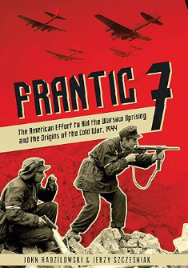
Frantic 7
by John Radzilowski, Jerzy Szcześniak
The Frantic operations were conceived in late 1943 as Soviet forces advanced westward into Ukraine, making Soviet airfields accessible to long-range aircraft based in Italy and later England. American aircraft hit targets in central Europe, refueled and rearmed at Soviet airbases, then flew back to bomb additional targets. In addition to hitting Nazi war industries, the political objectives of Frantic were to build closer cooperation with the Red Army as thoughts turned to what would come after the war finally ended. The first Frantic operation was in June 1944 and operations continued through July, despite continued Soviet misgivings.
For the first two weeks after the Warsaw Uprising began on August 1, 1944, Soviet forces stood idle outside the city, and Stalin refused to let the RAF land at Soviet airfields after dropping supplies to the Polish freedom fighters. But eventually, the United States managed to persuade him to let them use Frantic to drop supplies to the Poles.
On September 18, 1944, American B-17 Flying Fortresses, supported by fighter planes, dropped arms, ammunition, medical supplies, and food over the city of Warsaw. The assistance came too late and had no bearing on the situation of the Polish freedom fighters in Warsaw. For many, Frantic 7 remains a mere gesture to placate Western public opinion, but the events of that day, and the courage of 1,220 airmen who risked their lives to bring them aid, are still remembered by the Poles of Warsaw.
This book gives a full narrative of the Frantic 7 operation itself. Using the firsthand accounts of the events from the freedom fighters on the ground in Warsaw, the fates of the young aircrew, in particular those of “I’ll Be Seeing You” are told in detail. It also sets Frantic 7 in its political context, and explains how the diplomatic wrangles help set the stage for the breakdown in relations between the Soviet Union and the United States, and the beginning of the path to the Cold War.
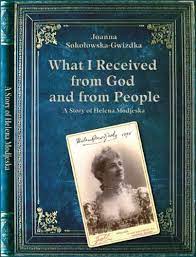
What I Received from God and from People. A Story of Helena Modjeska (Modrzejewska).
by Joanna Sokolowska
What I Received from God and from People is a story about Helena Modjeska (Modrzejewska) (1840-1909), the most famous American actress of her time, who, thanks to her extraordinary talent and brilliant interpretations of Shakespearian heroines, popularized Shakespeare’s plays in America. Modjeska appeared on many stages, big and small; on the one hand she repeatedly performed at the Metropolitan Opera in New York (where she closed her career with a memorable performance) and on the other hand, reached the stages of numerous provincial theaters all over the United States and Canada. Her successes were regularly reported in national and local newspapers, where she received enthusiastic reviews. She was famous and extremely popular among the American and Canadian audiences.
The book presents Modjeska’s personal life and her professional triumphs and failures, as well as some difficult choices she had to face and tough decisions she had to make. It shows how the two sides of her life – the real and the stage life – interlaced. Even though the book can be read in two evenings, it leaves a lasting impression of an exceptional person and an outstanding American actress-immigrant, a portrait of an artist in her epoch. The book is very nicely published (paperback with dust cover, matte paper, many never published before photographs). The book is bilingual – English and Polish. Polish title: “Co otrzymalam od Boga i ludzi. Opowiesc o Helenie Modrzejewskiej.” More information: http://www.modjeskabook.com